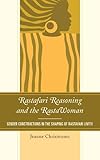Rastafari reasoning and the Rastawoman : gender constructions in the shaping of Rastafari livity / Jeanne Christensen.
Material type: TextSeries: Critical Africana studiesPublisher: Lanham : Lexington Books, [2014]Description: 1 online resource (xiv, 187 pages)Content type:
TextSeries: Critical Africana studiesPublisher: Lanham : Lexington Books, [2014]Description: 1 online resource (xiv, 187 pages)Content type: - 9780739175743
- 0739175742
- 9780739175743
- 1306573408
- 9781306573405
- Women in the Rastafari movement -- Caribbean Area
- Rastafari movement -- Caribbean Area
- Feminism -- Caribbean Area
- Feminism -- Religious aspects
- Femmes dans le rastafarisme -- Caraïbes (Région)
- Rastafarisme -- Caraïbes (Région)
- Féminisme -- Caraïbes (Région)
- Féminisme -- Aspect religieux
- BODY, MIND & SPIRIT -- Spirituality -- Paganism & Neo-Paganism
- RELIGION -- Comparative Religion
- Feminism -- Religious aspects -- Rastafarians
- Feminism
- Rastafari movement
- Women in the Rastafari movement
- Caribbean Area
- Frau
- Frauenbewegung
- Geschlechterrolle
- Rastafari
- Karibik
- 299.6/76082 23
- BL2532.R37
- online - EBSCO
| Item type | Current library | Call number | URL | Status | Notes | Barcode | |
|---|---|---|---|---|---|---|---|
 eBook
eBook
|
Biblioteca "Angelicum" Pont. Univ. S.Tommaso d'Aquino Nuvola online | online - EBSCO (Browse shelf(Opens below)) | Online access | Not for loan (Accesso limitato) | Accesso per gli utenti autorizzati / Access for authorized users | (ebsco)754962 |
Includes bibliographical references (pages 153-175) and index.
African religiosity -- The Afro-Creole village -- Emergence of Rastafari -- Reasoning and the Rastaman woman -- Taking root -- "From the cross to the throne" -- The arrival of Rastawoman.
Print version record and CIP data provided by publisher; resource not viewed.
"Rastafari Reasoning and the RastaWoman: Gender Constructions in the Shaping of Rastafari Livity examines the complex ways that gender and race intersected in the shaping of a liberation movement propelled by conscious contact with an African spiritual ethos as it had evolved in the Caribbean. Jeanne Christensen proposes that Rastafari represents the most recent reworking of this spiritual ethos, referred to as African religiosity. The book contributes a new perspective to the literature on Rastafari, and through a historical lens corrects the predominant static view of Rastafari women. In certain Rastafari manifestations, a growing livity developed by Rasta men eventually excluded women from an important ritual called "Reasoning"--A conscious search for existential and ontological truth through self-understanding arrived at in group deliberation. Restoring agency to the RastaWoman, Christensen argues that RastaWomen, intimately in touch with this spiritual ethos, challenged oppressive structures within the movement itself. They skirted official restrictions, speaking out in public and written forums whenever such avenues presented themselves, and searched for their own truth through conscious intentional self-examination characteristic of the Reasoning ritual. With its powerful, theoretically informed narrative, Rastafari Reasoning and the RastaWoman: Gender Constructions in the Shaping of Rastafari Livity will appeal to students and scholars interested in religious transformation, resistance movements, gender issues, critical race studies, and the history and culture of the English-speaking Caribbean."-- Provided by publisher
English.


